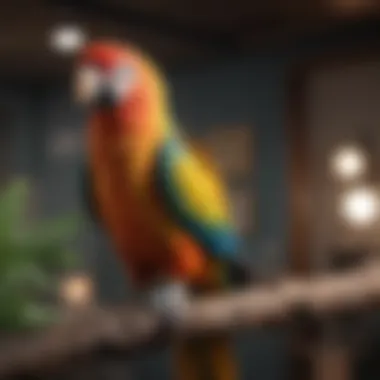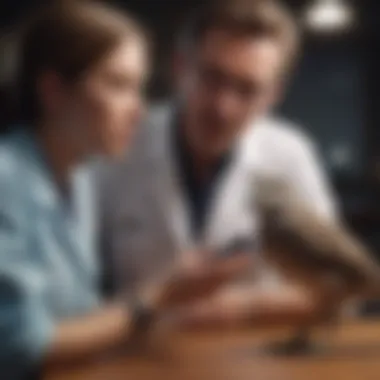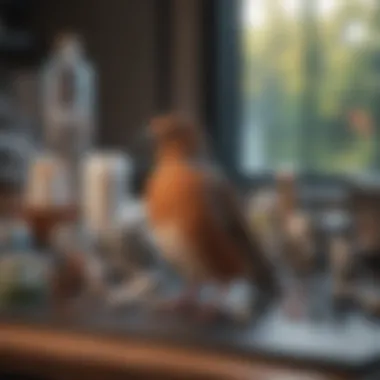Understanding Bird Vet Costs: A Complete Guide


Intro
Understanding the various costs associated with avian veterinary care is essential for any bird owner. Birds are unique pets with specific health and care needs. Having a clear grasp of what these costs entail helps pet owners prepare for routine and unexpected expenses alike.
This guide explores the factors that influence bird vet costs, the types of services offered, and how to manage these expenses effectively. It also discusses financial planning and insurance options. Additionally, preventative care strategies will be mentioned, which play a vital role in mitigating unexpected costs down the line.
Understanding Your Pet
To effectively manage vet costs, begin with understanding your pet. Each bird species has its own behaviors, characteristics and needs. This knowledge lays the foundation for informed decisions around care.
Pet Behavior Basics
Birds communicate differently than mammals. Understanding common behaviors, such as vocalizations and body language, helps owners detect health issues early. For example, a sudden change in vocalization may indicate stress or illness.
Common Breed Characteristics
Different bird breeds exhibit distinct characteristics that affect their health requirements. Larger birds, such as macaws, often require more maintenance and can incur higher vet costs compared to smaller species like finches.
Species-Specific Needs
Each species has specific needs. For instance, parrots often need specialized diets high in fruits and vegetables, while canaries may thrive on seeds. Comprehending these needs can help in both preventative care and budgeting for vet visits.
Pet Care and Maintenance
Pet care and maintenance encompass various activities that contribute to a bird's overall health. Proper care habits reduce potential health issues, thereby saving money in the long run.
Feeding Guidelines
A balanced diet is key. Birds require a mix of seeds, pellets, fruits, and vegetables. Consult with your avian vet for tailored feeding recommendations.
Grooming Essentials
Grooming is part of pet care. Regular nail trimming is essential, as overgrown nails can cause discomfort. Birds also benefit from baths to maintain feather health.
Hygiene Practices
Maintaining cleanliness in their living environment helps prevent diseases. Regularly clean cages and replace bedding materials.
Training and Development
Training influences a bird's behavior and socialization. Well-trained birds are less likely to develop behavioral issues.
Basic Commands and Skills
Teach simple commands. Basic commands like
Overview of Bird Veterinary Care
Veterinary care for birds is a crucial topic for pet owners. Birds, like any other pets, require specialized attention to maintain their health and wellbeing. The intricacies of bird veterinary care are not just about feeding and handling; they encompass a range of health issues, preventive measures, and specific treatments that differ significantly from canine and feline healthcare.
What is a Bird Vet?
A bird vet is a veterinarian who specializes in avian medicine. These professionals undergo extensive training and education focused specifically on birds, understanding their unique biology, behavior, and medical needs. Unlike standard veterinarians, who may only have a cursory understanding of birds, a bird vet is equipped to diagnose and treat specific conditions that can affect these creatures.
Bird vets perform various services such as check-ups, vaccinations, and emergency care. They are well-versed in the dietary requirements, environmental needs, and behavioral issues that can arise in pet birds. This specialized knowledge is vital for preventing illnesses that are common in avian species.
Importance of Specialized Care
Birds are delicate animals requiring careful handling and specific medical attention. The importance of specialized veterinary care cannot be overstated. Pet owners often underestimate how different birds are compared to other pets. For example, bird physiology and behavior can vary greatly, making it essential for veterinary care to be tailored to their needs.
Proper veterinary care can significantly extend a bird's lifespan.


Choosing a veterinarian who understands birds contributes to better health outcomes. Common conditions in birds include respiratory issues, feather plucking, and nutritional deficiencies, each requiring targeted treatment strategies. Regular visits to a bird vet help ensure that potential health issues are identified early, ultimately saving pet owners both emotional distress and financial burden in the long term.
Engaging with an avian specialist improves the overall care a bird receives. Avian vets provide guidance not just on medical issues but also on proper housing, nutrition, and behavioral enrichment. All these elements come together to foster an environment that promotes the health and happiness of pet birds.
Factors Influencing Bird Vet Costs
Understanding the factors that affect bird vet costs is crucial for any pet bird owner. Birds, as companions, require specialized care because they have unique health needs. Knowing what influences these costs can help owners prepare both mentally and financially for their pet's care. This section outlines three key factors: the type of bird, geographical location, and complexity of care.
Type of Bird
When it comes to bird vet costs, the type of bird one owns plays a significant role. Smaller birds, such as finches or budgerigars, often have lower veterinary expenses compared to larger species like macaws or cockatoos. This difference arises from various factors, such as the breed's susceptibility to certain health issues and the complexity of their care. For instance, exotic birds tend to require specialized treatment, which can come at a premium. Owners should research their specific bird species to understand their typical health concerns and associated treatment costs. It is essential to budget for regular check-ups tailored to the needs of their breed.
Geographical Location
Geographical location can drastically affect the cost of bird vet services. Urban areas may offer more specialized clinics with higher operating costs, leading to steeper prices. In contrast, rural regions might have limited access to avian vets, requiring owners to travel further, which adds travel costs on top of the treatment fees. Additionally, state regulations and local market dynamics can impact pricing. Therefore, potential pet owners should research local veterinarian options and their pricing structures to avoid unexpected expenses.
Complexity of Care
The complexity of care required also impacts veterinary costs. Routine visits involve standard procedures like check-ups and vaccinations, typically at a lower cost. Conversely, if a bird has specific health issues or requires surgical interventions, costs can escalate quickly. Treatment for diseases or long-term conditions requires ongoing monitoring and possibly multiple vet visits, driving overall expenses higher. Pet owners should be aware of potential complications that could arise with their birds and plan accordingly. Being preventive and proactive can help mitigate these costs in the long run.
Understanding these factors can significantly alter how bird owners prepare financially for their pets' health needs. By being aware of the type of bird, local availability of veterinary services, and care complexity, they can plan better.
Common Veterinary Services and Their Costs
Veterinary care for birds is not just about addressing emergencies or health issues; it also encompasses a range of common services that play a crucial role in their overall well-being. Understanding the costs associated with these veterinary services helps bird owners make informed choices. Regular visits to the veterinarian can preempt costly treatments down the line and ensure that birds lead long, healthy lives. This section explores routine check-ups, vaccinations, emergency care, and surgical procedures, highlighting their importance and typical costs.
Routine Check-ups
Routine check-ups are essential for monitoring the health of your bird. During these visits, a veterinarian will perform a thorough examination. This includes checking weight, assessing feather condition, and listening to heart and lung sounds. Additional tests such as blood work may be suggested to catch potential issues early.
Costs for routine check-ups vary based on location and the vet's experience. Typically, you can expect to pay between $50 to $150. Regular check-ups not only ensure your bird's current health but can also help in learning about preventative care – keeping your feathered friend in optimal condition.
Vaccinations
Vaccinations serve to protect birds from various diseases that can be fatal. Although not all bird species require the same vaccines, many vets recommend them based on the bird's species and lifestyle. Common vaccinations include those for avian polyomavirus, psittacosis, and infectious bronchitis.
The cost for vaccinations can range widely, often between $25 to $75 per vaccination. It’s vital to discuss vaccination schedules with your avian vet to provide the best protection possible. Early and regular vaccinations save you from potential future health complications.
Emergency Care
Emergency care is often unexpected and may arise from an accident or acute illness. Quick action in these situations can often be lifesaving. Veterinarians may provide immediate care, which could include diagnostics, surgeries, or hospitalization.
The pricing for emergency services can vary greatly depending on severity and required treatments. It's not uncommon for costs to range from $150 to over $1,000, depending on the complexity of care needed. Having a plan in place for potential emergencies is vital for every bird owner, as immediate care can dramatically influence outcomes.
Surgical Procedures
Surgical procedures may be necessary for a variety of reasons, from spaying and neutering to more serious issues like tumor removal. Avian surgery often requires specialized skills and tools not found in general veterinary practices, which can drive up costs.
On average, surgical procedures for birds may range from $200 to $1,200 or more. It is crucial to choose a vet who has experience in avian surgeries to ensure a higher success rate and better post-operative care. Investing in the right veterinary care can yield positive outcomes for your bird's health in the long run.
Key Takeaway: Understanding the costs associated with common veterinary services encourages proactive health management for birds, ultimately leading to healthier lives.
Knowledge of these services and their costs is essential for pet owners. Setting aside a budget and informing yourself can foster better relationships between you and your bird, ensuring their health and wellness through proper veterinary care and attention.
Preventative Care to Reduce Costs
Preventative care is a crucial component of managing the overall health of your bird. By investing in preventative measures, you can significantly lower long-term veterinary costs and enhance your pet's quality of life. This section will explore diet and nutrition, routine maintenance, and environment management, all of which play key roles in reducing the likelihood of health issues.
Diet and Nutrition
A balanced diet is essential for your bird's well-being. Nutrition directly affects their physical condition, energy levels, and susceptibility to diseases. Providing a species-appropriate diet can prevent various health disorders associated with improper feeding. For example, birds require a mix of seeds, pellets, fruits, and vegetables. Failing to offer the right food may lead to obesity or malnutrition, which could result in expensive treatments.


Regular consultation with a bird vet about dietary requirements ensures your pet gets the necessary nutrients. A good diet can ward off health issues that require costly interventions.
Routine Maintenance
Routine maintenance includes regular check-ups and grooming, which are essential for identifying health concerns before they escalate. Scheduling bi-annual visits to a specialized bird vet can catch potential health problems early.
Moreover, consistent grooming of feathers and nails helps maintain your bird's comfort and hygiene. This can prevent conditions like feather-plucking or foot problems that may require veterinary intervention.
To minimize costs, develop a maintenance schedule that incorporates vet visits and care activities. Staying proactive will save money in the long run.
Environment Management
The living environment greatly influences your bird's health. A clean and safe habitat prevents ailments linked to stress or infection. Ensure your bird cage is spacious, clean, and furnished with toys that encourage physical activity. Poor living conditions can lead to behavior issues and illnesses, leading to a higher likelihood of emergency visits.
Consider using non-toxic materials and cleaning agents to avoid exposing your bird to harmful substances. By prioritizing a healthy environment, you reduce the risk of veterinary costs associated with preventable health issues.
By investing time and resources in preventative care, bird owners can create a healthier living situation that directly impacts veterinary expenses.
Financial Planning for Bird Veterinary Care
Planning for financial aspects of avian care should not be taken lightly. Birds often require specialized veterinary attention, which can lead to significant expenses. Understanding these costs and creating a solid financial plan is essential for pet owners who wish to provide quality care for their feathered companions. This segment explores the importance of budgeting for veterinary expenses and the value of having an emergency fund.
Budgeting for Routine and Unexpected Expenses
When it comes to budgeting for avian healthcare, it is vital to recognize that expenses can come in various forms. Routine check-ups are typically more predictable but they can still add up over time. Costs may include:
- Annual examinations
- Vaccinations
- Preventative treatments
In addition to these expected expenses, bird owners need to prepare for unexpected costs. Birds can experience sudden health issues, which may require immediate veterinary intervention. These unexpected incidents can lead to:
- Emergency visits
- Surgical procedures
- Specialized treatments
Creating a detailed budget that captures both routine and unexpected expenses is beneficial. This can involve, for instance, averaging out the costs of routine care and setting aside a specific amount each month.
“Proper budgeting not only ensures regular care but also prepares you for the unknown.”
Setting Up an Emergency Fund
Having an emergency fund specifically for bird veterinary care adds a layer of security. Birds can face unforeseen health challenges that could require immediate attention. An emergency fund can safeguard against financial strain when these situations arise. Consider these steps for setting up an effective fund:
- Determine an Optimal Fund Size: Assess typical emergency costs to decide how much to save.
- Regular Contributions: Even small, consistent deposits can grow substantially over time.
- Separate Account: It might be helpful to keep this fund in a separate savings account for ease of tracking.
Insurance Options for Bird Owners
Understanding the financial landscape of avian healthcare can significantly impact a bird owner's ability to provide the necessary care for their pet. Bird veterinary services can be unexpectedly costly, making insurance a valuable asset in managing these expenditures. Insurance can mitigate financial stress, allowing owners to focus on their pet's well-being rather than the cost of care. In this section, we will explore the different types of pet insurance available specifically for birds and help owners choose the right policy for their needs.
Types of Pet Insurance
When it comes to avian insurance, there is not a one-size-fits-all solution. Various insurance providers offer plans tailored to birds, each with its unique features. Some common types of pet insurance for bird owners include:
- Accident-Only Coverage: This basic plan covers medical expenses related to accidents, such as fractures or injuries resulting from falls.
- Illness Coverage: This option provides coverage for illnesses that may affect your bird, including respiratory issues, infections, or other health conditions.
- Comprehensive Plans: These plans typically combine accident and illness coverage, providing broader financial protection against a variety of potential health issues.
- Wellness Plans: This type of policy often covers routine care costs. This includes check-ups, vaccinations, and preventive care, which can save money in the long run.
Choosing the right type of insurance depends on your bird's specific needs and your willingness to pay premiums. Each type has its advantages, so it’s important to assess what coverage best suits your situation.
Choosing the Right Policy
Selecting the right insurance policy for your bird requires careful consideration. The following factors are key when evaluating options:
- Premium Costs: Compare the monthly or yearly premiums across different providers. Determine what fits within your budget without sacrificing necessary coverage.
- Coverage Limits: Check the limits on policy payouts. Some may have caps on how much they will reimburse for specific treatments or procedures.
- Exclusions and Waiting Periods: Understand what is not covered under a policy. Many plans exclude pre-existing conditions, and some have waiting periods before coverage begins.
- Reputation of the Insurer: Investigate feedback and reviews of the insurance company. A company with a solid reputation for customer service and claims processing can ease concerns when seeking care for your bird.
In summary, proper research and analysis of insurance options can provide peace of mind for bird owners. By investing in a suitable insurance policy, you can ensure that your feathered companion receives vital medical attention without the burden of unexpected financial stress.


Always read the policy details thoroughly to understand what you are getting.
Finding a Qualified Bird Vet
Finding a qualified bird vet is a critical step for any bird owner. The health and wellbeing of your avian companion depend heavily on the level of care, which requires specialized knowledge due to the unique physiology and needs of birds. Selecting the right veterinarian is not just about finding a clinic; it is about ensuring that your pet receives the best possible attention tailored to its species-specific requirements.
Researching Local Clinics
When searching for a bird vet, start by researching local veterinary clinics that advertise expertise in avian care. Consider the following aspects while conducting your research:
- Specialization: Look for clinics that specifically mention their specialization in treating birds. This can often be found on their website or promotional materials.
- Reviews: Testimonials and reviews from other pet owners can provide insight into the quality of care provided. Focus on comments regarding their experience with avian care.
- Facilities: Assess the clinic's facilities if possible. A veterinary office that has the proper equipment for birds such as an avian pharmacy, surgical tools, and recovery areas tailored for birds is an indicator of quality.
- Location: Ensure the clinic is easily accessible. In case of emergencies or frequent visits, a nearby location can make a significant difference.
This initial research can provide a shortlist of potential vets and help narrow down the options.
Evaluating Vet Credentials
Once you have a list of clinics, evaluating the credentials of the veterinarians is the next important step. It is essential to ensure that the vet has appropriate qualifications for avian care. Consider the following factors:
- Education: Check if the vet has graduated from a recognized veterinary school and if they have completed a residency or further training in avian medicine.
- Certifications: Observe if they possess certifications from accredited bodies such as the American Board of Veterinary Practitioners (ABVP), which includes avian practice as a specialty.
- Experience: Discuss the vet's experience with birds. Ask how many birds they have treated and specific species they are familiar with. Experience can greatly influence the quality of care.
- Continuing Education: Vet fields evolve constantly, and good veterinarians engage in ongoing education. Verify if they attend workshops or conferences related to avian health.
Choosing a qualified bird vet can significantly impact the long-term health and well-being of your feathered friend.
Taking time to research and evaluate local clinics and their veterinarians is crucial. A well-informed choice leads to better health outcomes and a healthier relationship with your pet.
Questions to Ask Your Bird Vet
As a bird owner, it is essential to understand the significance of communicating effectively with your veterinarian. Developing a solid partnership with a qualified bird vet is instrumental in ensuring your pet’s health. This section outlines crucial questions that can guide effective dialogue, helping you make well-informed decisions regarding your feathered companion’s care.
Discussing Treatment Plans
One of the primary areas to discuss with your vet is the treatment plan for your bird. Understanding the reason for a specific treatment is vital. Ask your vet the following questions:
- What is the diagnosis? Knowing the exact issue your bird faces helps you comprehend the treatment's necessity.
- What are the proposed treatments? Inquire about various treatment options. This can also include benefits and potential side effects associated with each choice.
- What is the expected outcome? Understanding the desired results helps set your expectations.
- What are the alternatives? If the initial treatment isn’t suitable, exploring other routes can offer you different perspectives.
- How will you monitor progress? Regular check-ins might be necessary to ensure the treatment is effective. Knowing what to expect here is crucial.
Engaging your vet in this manner not only fosters better care for your bird but also reinforces your role as an informed pet owner.
Understanding Costs
Financial considerations are an important part of veterinary care. Therefore, addressing costs of the proposed treatments is necessary:
- What will the total cost be? Request a detailed estimate that breaks down the costs involved in the treatment plan.
- Are there any unexpected fees? Inquire about potential additional costs. This can help prevent surprises on your final bill.
- Is payment plan available? Some clinics provide options to make payments more manageable. It’s worth discussing this with your vet.
- Does this cost include follow-up visits? Knowing whether future visits are covered allows you to plan your budget more carefully.
It’s prudent to understand these financial aspects of avian care. Effective planning can assist in minimizing unexpected expenses and enable you to provide the care your bird requires without undue stress.
“Understanding the costs involved in avian vet care is just as vital as knowing about treatment options.”
Epilogue: Balancing Care and Costs
In evaluating bird veterinary expenditures, it becomes crucial to strike a balance between providing quality care and managing costs effectively. Pet owners face the challenge of ensuring their birds receive appropriate medical treatment without incurring excessive financial burdens. Achieving this balance benefits not only the pet but also the owner's peace of mind.
The Importance of Quality Care
Quality care is indispensable when it comes to avian health. A well-cared-for bird can lead to a longer, healthier life. When considering the cost of veterinary services, think of it as an investment in the well-being of your feathered companion. Many bird owners may be tempted to opt for cheaper options, sacrificing quality for affordability. However, this can lead to more significant health issues down the line, resulting in even greater expenses.
- Regular check-ups help in early detection of issues.
- Specialized care is critical for certain species, addressing their unique needs.
- Vaccinations protect against diseases that could be costly to treat if contracted.
Therefore, investing in quality veterinary care reflects an owner's commitment to their bird's health and well-being.
Long-term Financial Considerations
Bird owners must also contemplate long-term financial ramifications when budgeting for veterinary care. It's essential to anticipate not just routine and emergency expenses but also the potential for chronic health conditions specific to certain species. Setting aside funds for veterinary care should be part of a comprehensive financial strategy.
To aid planning, consider these points:
- Establish an emergency fund to cover unexpected health needs or urgent procedures.
- Regularly assess veterinary expenses and adjust your budget accordingly.
- Explore veterinary insurance options to help offset costs over time.
Proper financial planning fosters better decision-making regarding healthcare choices, ensuring that birds receive the necessary treatment without undue stress on the owner's finances.
Ultimately, understanding the costs associated with bird veterinary care empowers pet owners. By focusing on quality care while also contemplating long-term financial needs, owners can ensure that their birds live healthy and fulfilling lives.





